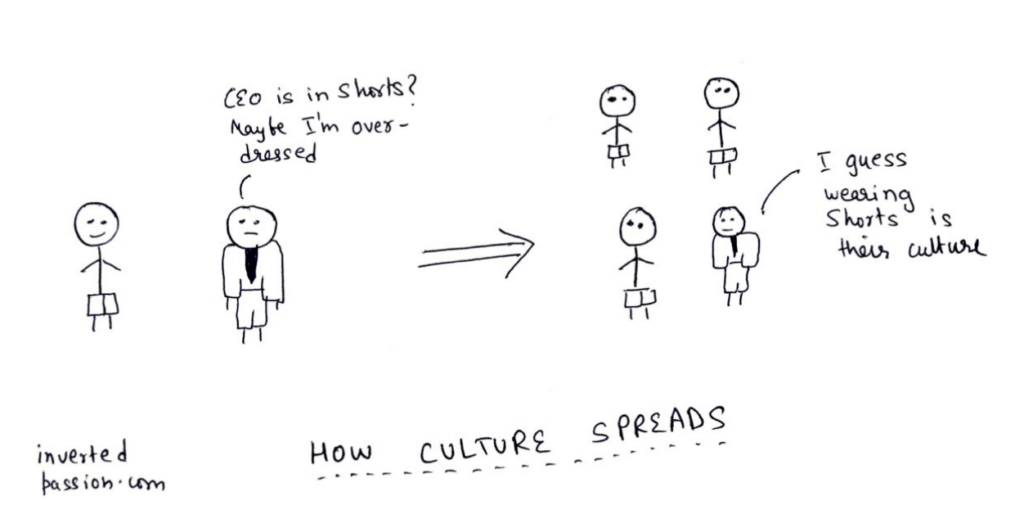Imagine you’re the founder of a startup project (it could be a company, a non-profit, a religion, or even a country). You have a weird habit: you like to come to the office by noon and stay late (say until 8 pm). You hire your first employee, and on the first day he arrives at the office at 9 am (just like he did in his previous job).
The empty office seems odd to him, and it becomes odder still when he sees you stroll by in the office during his lunchtime. In the evening, since it’s the first day of his job, he waits for you to leave but the entire time, you are happily busy on your laptop. You leave the office by 9 pm and a couple of minutes after you, the new hire leaves. Thinking of his first day as a fluke, the new employee comes in early again tomorrow but the same thing repeats.

As you can guess, new employees usually don’t confront their bosses in the early days, so they end up adapting themselves to their bosses’ weird habits. When another new employee joins, she now sees two people working from noon-8 pm. So the pressure is even more to conform. As the team grows, for new hires, the situation gradually starts looking like a cult to the outsiders (a group of people who work from noon to 8 pm).
As more people join and the more time passes, the harder it is for anyone (including the old members) to change these joint habits. Continuing with the previous example, imagine that the company has now grown to 100 people and the CEO has had a change of heart. He declares that the noon timing is no longer OK and that everyone has to come to the office by sharp 9 in the morning. How do you think this proposal will be perceived by the company?
The criticism will likely be one among these: “our culture is changing”, “It’s not like the old days anymore” and “Here are 99 reasons why noon-8 pm is the best timing”. People don’t like to change their habits when they’re the norm around them.
If the CEO himself faces resistance to changing these culturally ingrained joint habits, imagine how difficult will it be for anyone else (including new joiners) to try doing the same?
Organizations are habit amplifying machines. What is amplified in an org are not just weird habits, but all habits (good or bad) of the initial founding team. Do founders like to read? They’ll attract, retain and encourage people to read. Soon enough – reading books becomes part of their culture.
In America’s case, since their founding fathers gave great emphasis on freedom of gun-owning, changing that now is political suicide for US politicians. Similarly, China’s totalitarianism that started with Mao Zedong’s reflects today in the government’s tracking and rating of its citizens. Apple’s maniacal focus on design continues even after the death of Steve Jobs.
When people ask why can’t China now adopt democracy given that they have everything else going for them, they’re missing the point that an organization resists change in its collective culture. And culture is nothing but common behaviors and habits exhibited by members of the org.
Cultures do change but the process is notoriously difficult. Often, the changes have to be gradual or a revolution needs to happen that brings a sudden but destructive change. In the default case, culture, once established, resists change.
Remember: new employees observe previous employees to guess what’s okay to do and what’s not okay. And you – the founder – are the first employee.
This essay is part of my book on mental models for startup founders.
Join 200k followers
Follow @paraschopra